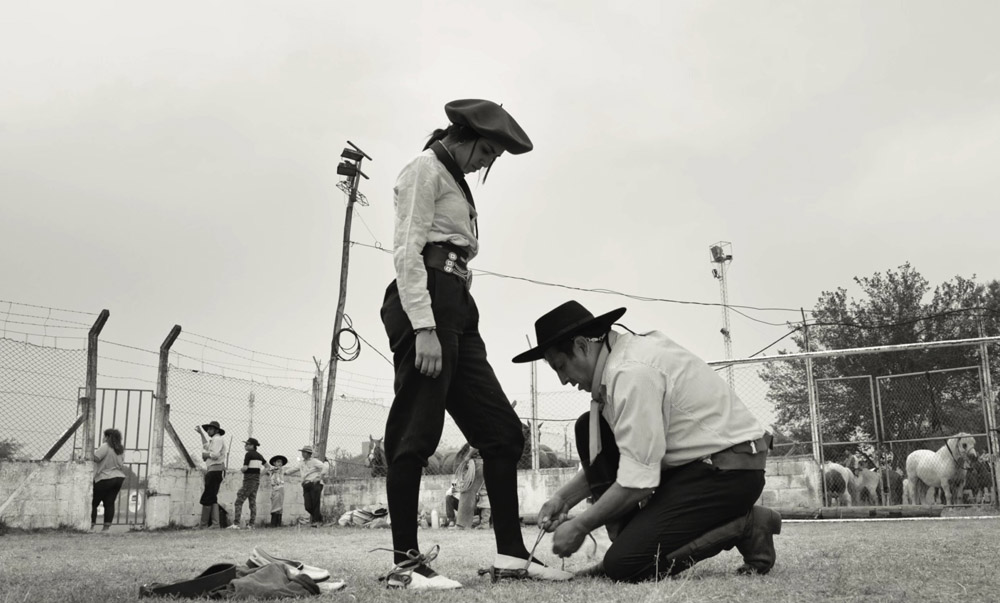About two-thirds into “Gaucho Gaucho,” Michael Dweck and Gregory Kershaw don’t reach a climax for their latest excursion into cowboy culture in Argentina, so much as a raison d’être for their work that they’ve undertaken together since 2018 with “The Last Race,” filming at a dying racetrack in Long Island where stock car racing was once born. Observing a pair of boys piece together the skeleton of a horse, it is a moment in which what’s been left behind is reimagined to see what life still remains in it as the children’s thoughts drift far more towards what it once was than what led to its death. As interested as Dweck and Kershaw have been in cultural preservation, their films, including 2020’s “The Truffle Hunters,” set in Piedmont, Italy where only a handful of people still know where to locate the vaunted ingredient, been less a reflection of history from the outside than an evocation of what their subjects see when they look at the place where they’ve made their lives, not necessarily nostalgic for what was but both the passion and perseverance required to keep tradition alive.
“Gaucho Gaucho” is the first of the duo’s films where one isn’t even remotely tempted to think much of the world outside of its setting in the Calachaqui Valley in the Argentinian province of Salta when as much as conventional wisdom suggests it’ll be hard to keep up the old ways as more years pass, the threat of extinction isn’t a driving force for the film. An empty street in the middle of town may be seen occasionally as the mark of a bygone era, but when a father asks his prepubescent son what he wants to be, there’s no hesitation in saying “Gaucho,” though you think he may know of no alternative. However, there is much enthusiasm about being a gaucho from those older than him, from the pair of aforementioned boys, who nearing their teenage years dress up to look like Clint Eastwood in “High Plains Drifter,” exploring the terrain for themselves and thrilled by the prospect of dust storms where they can throw up their ponchos to catch the wind, and a slightly older young woman, who has defied her high school’s uniform policy by wearing her gaucha gear to class and makes every effort to fit the clothes as she learns how to tame a stubborn horse and compete in the local rodeo.
Dweck, who came to filmmaking by way of narrative still photography, has always expertly made use of an ultra-wide lens, but perhaps never more so than here when creating tableaus that can speak to the entire panorama of the gaucho experience. One particularly breathtaking shot near the start of the picture spans a celebration where someone on the left can be seen manning the grill while on the other end, dancing commences and the frames can convey a totality of life beyond a grandeur, hardly glossing over the brutal aspects of living off the land when prayers are sent up for rain and cattle, which are the lifeblood of the community, are preyed upon by hungry condors, among other threats, but the rewards that have made it sustainable for so long. Still, as a younger generation is enchanted by possibility and the pride their parents take in the gaucho life, those in their thirties and forties can be a little more anxious, tending to the fields and herd cattle without the certainty that it will endure, not because there will be no one there to continue the legacy as much as the whims of nature. Dweck and Kershaw may never let it show that they’re sweating as much as their subjects in order to observe them, yet “Gaucho Gaucho” exudes the same sense of strength and fragility that governs their existence, going further than capturing a moment to truly allow one to live inside of it.
“Gaucho Gaucho” will screen at the Sundance Film Festival on January 20th at 6:45 pm at the Redstone Cinemas in Park City, January 21st at 3 pm at the Megaplex Theatres at the Gateway, and January 24th at 8:45 pm at the Egyptian Theatre in Park City. It will also be available virtually from January 25th through 28th.




